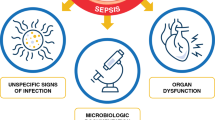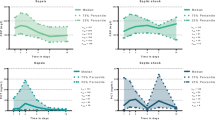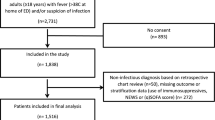Abstract
Background
The C-reactive protein/albumin (CRP/Alb) ratio is associated with outcome in septic patients. However, as an inflammation-based score, its prognostic value for cancer has scarcely been investigated.
Methods
Between February 2010 and January 2015, we enrolled 386 patients with pancreatic ductal adenocarcinoma. Univariate and multivariate survival analysis between the groups were evaluated. Receiver operating characteristics curves were generated and areas under the curve (AUC) were compared to evaluate the discriminatory ability of the inflammation-based prognostic scoring systems, including CRP/Alb ratio, neutrophil–lymphocyte ratio (NLR), platelet–lymphocyte ratio (PLR) and modified Glasgow prognostic score (mGPS).
Results
The optimal cutoff level of the CRP/Alb ratio was defined as 0.180. The prognosis of patients with CRP/Alb ratio ≥0.180 was significantly worse than CRP/Alb ratio <0.180 in univariate analysis (p < 0.001). In multivariate analysis, the CRP/Alb ratio was still associated with overall survival (p < 0.001). In addition, the CRP/Alb ratio had significantly higher AUC values compared with PLR (6, 12, and 24 months: p < 0.001, 0.017, 0.012) and mGPS (6, 12, and 24 months: p = 0.002, 0.020, 0.046) and had similar AUC values to NLR (6, 12, and 24 months: p = 0.052, 0.139, 0.041).
Conclusions
The current study demonstrated the CRP/Alb ratio may serve as a significant and promising inflammatory prognostic score in pancreatic cancer. An elevated CRP/Alb ratio is an independent factor for poor prognosis with the cutoff value of 0.180.


Similar content being viewed by others
References
Liu Z, Luo G, Guo M, et al. Lymph node status predicts the benefit of adjuvant chemoradiotherapy for patients with resected pancreatic cancer. Pancreatology. 2015;3:253–8.
Luo G, Guo M, Liu Z, et al. Blood neutrophil–lymphocyte ratio predicts survival in patients with advanced pancreatic cancer treated with chemotherapy. Ann Surg Oncol. 2015;2:670–6.
Lee S, Oh SY, Kim SH, et al. Prognostic significance of neutrophil lymphocyte ratio and platelet lymphocyte ratio in advanced gastric cancer patients treated with FOLFOX chemotherapy. BMC Cancer. 2013. doi:10.1186/1471-2407-13-350
Absenger G, Szkandera J, Pichler M, et al. A derived neutrophil to lymphocyte ratio predicts clinical outcome in Stage II and III colon cancer patients. Br J Cancer. 2013;2:395–400.
Proctor MJ, McMillan DC, Morrison DS, Fletcher CD, Horgan PG, Clarke SJ. A derived neutrophil to lymphocyte ratio predicts survival in patients with cancer. Br J Cancer. 2012;4:695–9.
Coussens LM, Werb Z. Inflammation and cancer. Nature. 2002;6917:860–7.
Kinoshita A, Onoda H, Imai N, et al. Comparison of the prognostic value of inflammation-based prognostic scores in patients with hepatocellular carcinoma. Br J Cancer. 2012;6:988–93.
Inoue D, Ozaka M, Matsuyama M, et al. Prognostic value of neutrophil–lymphocyte ratio and level of C-reactive protein in a large cohort of pancreatic cancer patients: a retrospective study in a single institute in Japan. Jpn J Clin Oncol. 2015;1:61–6.
Hashimoto K, Ikeda Y, Korenaga D, et al. The impact of preoperative serum C-reactive protein on the prognosis of patients with hepatocellular carcinoma. Cancer Am Cancer Soc. 2005;9:1856–64.
Morrison L, Laukkanen JA, Ronkainen K, Kurl S, Kauhanen J, Toriola AT. Inflammatory biomarker score and cancer: a population-based prospective cohort study. BMC Cancer. 2015. doi:10.1186/s12885-016-2115-6.
Karakiewicz PI, Hutterer GC, Trinh QD, et al. C-reactive protein is an informative predictor of renal cell carcinoma-specific mortality: a European study of 313 patients. Cancer Am Cancer Soc. 2007;6:1241–7.
McMillan DC. The systemic inflammation-based Glasgow prognostic score: a decade of experience in patients with cancer. Cancer Treat Rev. 2013;5:534–40.
Fairclough E, Cairns E, Hamilton J, Kelly C. Evaluation of a modified early warning system for acute medical admissions and comparison with C-reactive protein/albumin ratio as a predictor of patient outcome. Clin Med (Lond). 2009;1:30–3.
Ranzani OT, Zampieri FG, Forte DN, Azevedo LC, Park M. C-reactive protein/albumin ratio predicts 90-day mortality of septic patients. PLoS One. 2013;3:e59321. doi:10.1371/journal.pone.0059321
Kinoshita A, Onoda H, Imai N, et al. The C-reactive protein/albumin ratio, a novel inflammation-based prognostic score, predicts outcomes in patients with hepatocellular carcinoma. Ann Surg Oncol. 2015;3:803–10.
Xu XL, Yu HQ, Hu W, Song Q, Mao WM. A novel inflammation-based prognostic score, the C-reactive protein/albumin ratio predicts the prognosis of patients with operable esophageal squamous cell carcinoma. PLoS One. 2015;9:e138657. doi:10.1371/journal.pone.0138657
Alifano M, Mansuet-Lupo A, Lococo F, et al. Systemic inflammation, nutritional status and tumor immune microenvironment determine outcome of resected non-small cell lung cancer. PLoS One. 2014;9:e106914. doi:10.1371/journal.pone.0106914
Aliustaoglu M, Bilici A, Seker M, et al. The association of pre-treatment peripheral blood markers with survival in patients with pancreatic cancer. Hepatogastroenterology. 2010;99–100:640–5.
Ino Y, Yamazaki-Itoh R, Shimada K, et al. Immune cell infiltration as an indicator of the immune microenvironment of pancreatic cancer. Br J Cancer. 2013;4:914–23.
Elinav E, Nowarski R, Thaiss CA, Hu B, Jin C, Flavell RA. Inflammation-induced cancer: crosstalk between tumours, immune cells and microorganisms. Nat Rev Cancer. 2013;11:759–71.
Roxburgh CS, McMillan DC. Cancer and systemic inflammation: treat the tumour and treat the host. Br J Cancer. 2014;6:1409–12.
Park EJ, Lee JH, Yu GY, et al. Dietary and genetic obesity promote liver inflammation and tumorigenesis by enhancing IL-6 and TNF expression. Cell. 2010;2:197–208.
Wei XL, Wang FH, Zhang DS, et al. A novel inflammation-based prognostic score in esophageal squamous cell carcinoma: the C-reactive protein/albumin ratio. BMC Cancer. 2015. doi:10.1186/s12885-015-1379-6.
Camp RL, Dolled-Filhart M, Rimm DL. X-Tile: a new bio-informatics tool for biomarker assessment and outcome-based cut-point optimization. Clin Cancer Res. 2004;21:7252–9.
Acknowledgment
This study was supported in part by the Sino-German Center (GZ857), by the Science Foundation of Shanghai (13ZR1407500), by the Shanghai Rising Star Extension Program (12QH1400600), by the Fudan University Young Investigator promoting Program (20520133403), by the Prospective Clinical Trial Project, Shanghai Cancer Center (YJLC201403) and by the National Science Foundation of China (Grant Nos. 81101807, 81001058, 81372649, 81372653, 81172276).
Author information
Authors and Affiliations
Corresponding authors
Ethics declarations
Conflict of interest
No benefits in any form have been received or will be received from a commercial party related directly or indirectly to the subject of this article. The authors declare no conflict of interest.
Ethical approval
This study was approved by the Ethics Board, Shanghai Cancer Center, Fudan University.
Additional information
Zuqiang Liu and Kaizhou Jin have contributed equally to this work.
Rights and permissions
About this article
Cite this article
Liu, Z., Jin, K., Guo, M. et al. Prognostic Value of the CRP/Alb Ratio, a Novel Inflammation-Based Score in Pancreatic Cancer. Ann Surg Oncol 24, 561–568 (2017). https://doi.org/10.1245/s10434-016-5579-3
Received:
Published:
Issue Date:
DOI: https://doi.org/10.1245/s10434-016-5579-3




